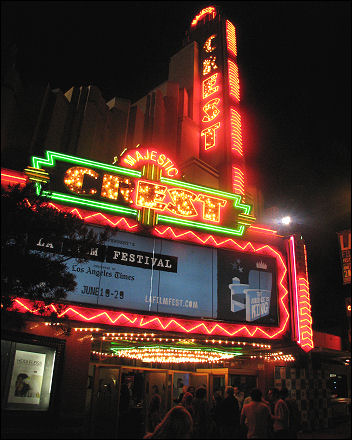“I prefer to watch shitty movies so I can feel good about myself. There is nothing better than sitting in bed and enjoying a shitty comedy. I laugh at the bad jokes and I smile as I convince myself, as I often need to, that my work doesn’t suck as bad as what I am watching. It gives me the confidence to make movies. I call them movies to have the flu by — movies that are great if you need to kill time while sitting in bed with the flu.” — a quote attributed to powerhouse comedy producer (and leading advocate of the exposed-penis galumph aesthetic among male actors) –Judd Apatow.
I don’t want to sound like an asshole, but you can also read history books when you’re sick. Or watch old Jean Renoir or Robert Bresson or Nicholas Ray movies. You know…nutritional stuff. Given, you know, the fact that you’ll be dead someday, and maybe sooner than you think. As Chris Farley realized one day with a start.
wired
Become It
To buzz around Rome on a scooter is not the life-threatening experience some would describe. At all. You just have to be sharp and watchful and submit yourself to the Roman rules of the road. You can’t wimp out . You have to “become that thing” — a Roman road warrior. That means you have to make those Roman car and scooter drivers be scared of you a little bit, but you have to do it with a laugh and a chuckle.
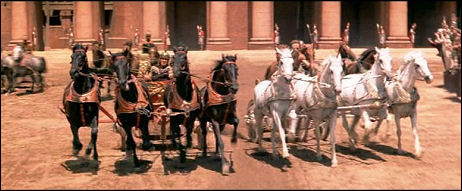
I have never felt quite so particularly thrilled as I have after scooting around that city. It’s glorious. It’s almost like taking part in the chariot race in Ben-Hur. A Rome-residing HE reader named “Nola” implied yesterday that the Roman streets are full of Stephen Boyds with metal knife blades sticking out of their chariot wheels. As Jake La Motta would say, “That’s in yo’ mind!” I’ve never run into that at all.
Even my late sister, a disabled woman who hid indoors for most of her life, fell in love with the experience.
Two Sides of the Fence
New York‘s Vulture guys, assessing the so-far universal praise for Pixar’s WALL*E, are trying to kick-start a campaign to give it a “real” Best Picture Oscar next February instead of — in their minds — an allegedly downgraded substitute tribute in the form of a Best Animated Feature Oscar.
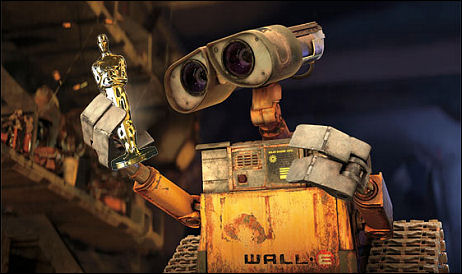
This is wrong, fellas. The animated realm means an emphasis on digital as opposed to organic raw-grain realism, and the Best Picture realm still means more or less the opposite. We’re obviously living in a world of increasing overlap between them — reality ain’t what it used to be — but distinctions must be recognized and the electric segregation fence must be respected and fortified. Question is, on which side of the fence is the grass greener in terms of creative possibility and realization? It’s debatable.
WALL*E is a glorious film, but there would be nothing the least bit diminishing if it takes the Best Animated Feature Oscar. It would be honorable and appropriate and a good thing all around. The Chicago Tribune‘s Michael Phillips has called WALL*E “the best science-fiction film so far this year, the best romance so far this year and the best American studio film so far this year.” True, but it doesn’t belong in the raw reality arena and its admirers (myself among them) know it.
“Could this be the year that the Academy finally realizes that Pixar movies are the closest Hollywood comes anymore to the great, classy populist entertainments that used to be nominated for a gazillion Oscars?,” the “Vulutre” piece says, “the kinds of movies that everyone complains have disappeared from the Academy Awards?”
That’s a largely true statement, I feel, but WALL*E is, I feel, an exception to the animation realm. The Pixar economy, invention and poetry bestow an unusual profoundity and a universal appeal, but it’s still — get real for a second — fundamentally made for and aimed at families, kids, X-factor moviegoers and film critics. And it uses a certain kind of paint and paint-brushes that are specifically intended to stir the imagination and summon metaphor.
In a certain way, WALL*E obviously reflects and recreates the world that we’ve built, that has been given to us, that we’re stuck in for better or worse. But only in that way. It’s fundamentally (and to its enormous credit) a dreamscape movie, and creating in that world requires a very specific discipline and sensibility that doesn’t vote, doesn’t pay bills, doesn’t enjoy the string and the brass on Miklos Roza‘s El Cid soundtrack, doesn’t drink good Pinot Grigio at parties, doesn’t pay $4.40 for a gallon of gas, doesn’t buy sour cream-and-onion potato chips at a 7-11 at 11:45 pm and doesn’t recoil from the lack of hygiene at a gas-station restroom.
There is an enormous high and an unfettered dignity that comes from simply aiming a camera at real people and real locations and making it all sing. Every now and then it happens. We all know there’s magic on the animation side of the fence, but the people who work it need to invest in their own land, sing their own songs, beat their own drums, wave their own flag and stay the fuck out of Reality Nation.
Screw CGI
In a 6.23 Wired piece, Scott Brown has portrayed — emphasized — director Chris Nolan‘s commitment to keeping the hard-drive special effects down to a minimum in The Dark Knight. “For Nolan, reality beats the hell out of gee-whiz special effects,” Brown writes. And to this goal, Nolan has “a cogent Theory of Applied Batmatics,” which means an “insist[ance] on reality — no effects, no tricks — up to the point where insisting on reality becomes unrealistic.
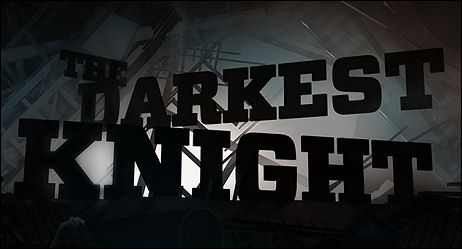
“Then, in post-production, make what is necessarily unreal as real as possible. ‘Anything you notice as technology reminds you that you’re in a movie theater,’ Nolan explains. ‘Even if you’re trying to portray something fantastical and otherworldly, it’s always about trying to achieve invisible manipulation.’ Especially, he adds, with Batman, ‘the most real of all the superheroes, who has no superpowers.’
“How ‘real’ are we talking here? When Nolan unveiled a six-minute Knight prologue on Imax screens last December (a twisty bank heist with a jarring Joker reveal), it was clear that his cinematic vision owes more to director Sidney Lumet than golden-age DC comics. You can feel the tension of Lumet’s 1975 Dog Day Afternoon and Michael Mann‘s 1995 drama, Heat.”
Inevitably Ledger’s?
“I just returned from a Dark Knight screening” — the one for junketeers they had last night at the Bridge — “and I wanted to commit this to a public forum as quickly as possible,” KTLA’s Sam Rubin wrote last night at 10:27 pm. “Heath Ledger‘s Joker is a blockbuster performance, and he will absolutely be nominated for an Oscar. And at this point in the year, Ledger is also a hands-down favorite to win it posthumously.
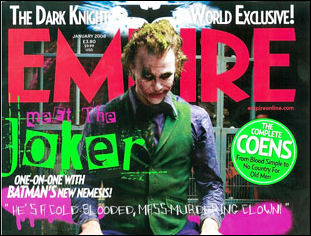
“Ledger offers perfect pitch, perfect tone…hits all the right notes. The Dark Knight is among the better super-hero movies of all time, and Ledger is the best villain in a super-hero movie of all time. Really. It will only add to the conversation [about] all that Ledger could have accomplished had he lived. Amazing work.”
If you’re going to give Ledger the Oscar at this stage — which is fine if Rubin really believes it to be a fact waiting to happen — aren’t you obliged to use adjectives that are a little more intriguing than “perfect” and “right”? Shouldn’t you try to describe the highs and contours of the performance, at least a little bit?
If I’d been there I would be posting at least two or three descriptive graphs of my reaction to Ledger’s performance. If I’d been invited, I mean. I’ve been hot to see this for months and months, like everyone else. But Warner Bros. publicity shut the door last September or October over very little — a certain party had a hissy fit — and a certain Manhattan-based distrib exec, in a show of manly resolve, refuses to reply to make-nice e-mails.

LAFF Thursday Night
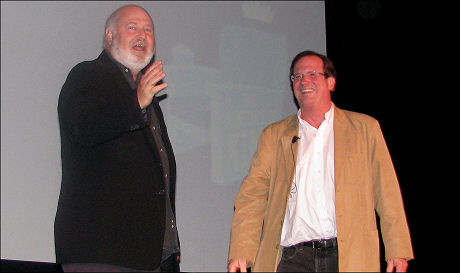
Rob Reiner, Pete Hammond just before pre-screening q & a at Billy Wilder theatre — Thursday, 6.26.08, 8:08 pm. A screening of Reiner’s The American President followed.
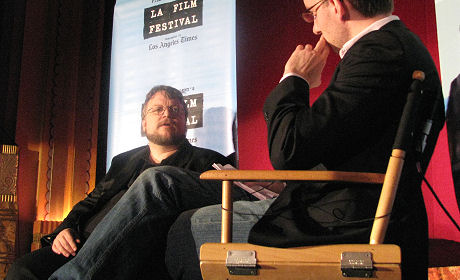
Guillermo del Toro, director of Hellboy 2: The Golden Army, and intelligent but obsequious questioner during q & a at Westwood’s Crest theatre — Thursday, 6.26, 7:15 pm.
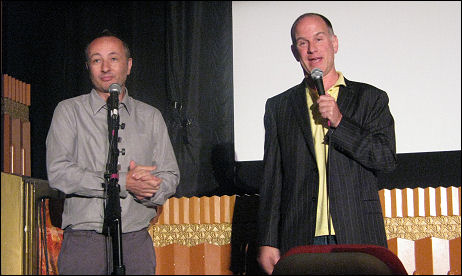
Fenton Bailey (l.) and Randy Barbato (r.), directors of Heidi Fleiss: The Would-Be Madam of Crystal, following Thursday night’s 9:30 pm screening at Westwood’s Crest theatre — 6.26, 10:55 pm.

Guillermo del Toro, director of Hellboy 2: The Golden Army, during q & a at Westwood’s Crest theatre — Thursday, 6.26, 7:15 pm.

Dawn Hudson, Rob Reiner at Westwood’s Billy Wilder theatre — 6.26, 8:05 pm.
Ardor Cools
The best thing about He’s Just Not That Into You, a New Line release that was supposed to come out on 10.24.08, has been the very cool title. Perhaps that’s the only cool thing about it. A 6.26 Life & Style article is reporting that the release date of this Ken Kwapis film, a romantic dramedy costarring Jennifer Aniston, Jennifer Connelly, Scarlett Johansson, Ben Affleck, Drew Barrymore, Justin Long and Bradley Cooper, has been pushed back to February 6, 2009. Which means, of course, that Warner Bros. distribution chiefs don’t have a lot of confidence in it. Is there another way to interpret this, if true?
Tetro Wraps
Francis Coppola‘s Tetro wrapped today after 63 days of principal photography in Buenos Aires and Patagonia. Additional shooting of an original ballet will be required in Madrid, Spain. Post-production will be based in Buenos Aires, Valencia, Spain and Italy, anticipating a spring 2009 release. I don’t mean to sound reactionary, but Coppola’s Youth Without Youth was so bad I’m filled with dread about this one. I’m especially worried about that Madrid shoot. Name a truly riveting film that has a ballet sequence in it. No — not Torn Curtain.

Tetro director Francis Coppla
Backpedal Like Crazy
A friend believes that the WALL*E team chose their ruined apocalyptic storyline due to the need for “simple dramaturgy — you need to start with your character in some kind of hole, with some sort of imbalance in his life. Something he needs to dig his way out of. And nothing could be simpler or more visual (or more humble for WALL*E’s vocation) than endless piles of trash.” In other words, he believes, “the eco-friendly message was a by-product of the storytelling process, rather than a driving force.”
I hear you, I responded in an e-mail, “but c’mon…global ruination and unbridled consumerism and gluttony are the raison d’etre of the thing. It’s the atmospheric masonry upon which the movie stands. And those tubby tubas in the space ship? The movie screams mirror reflection and green metaphor at every turn.
“The robot love story is the sweet through-line and the congenial icing on the cake, and that’s fine. But I find it almost comical that the Pixar guys make the damn thing, and then when the release approaches they back-pedal like crazy trying to pretend it’s not what it is. Because we live in a nation of obese consumers and the Pixar marketers don’t want to piss them off. Amazing.”
Mess Around
In his “Wheels” column, N.Y. Times guy Nick Kurczewski guy writes about a deal offered by Sergio Cagia of Nero Tours in which a couple pays $300 to take a three-hour tour of Rome on a couple of Vespa scooters. Three times I’ve rented bikes-for-two in Rome for a little more than one-third that amount. Same streets, same excitement, same sense of “fun while feeling impossibly cool.” I’m stunned that anyone would be dumb enough to pay $300 just so they can look swift on a classic Vespa.

Sleeper
Out of nowhere I decided yesterday morning to drive out to El Monte to buy this gal, an eight-week old Siamese. I told myself the kitten would be good company for an older cat, a gray tabby, I’m taking care of for a few weeks. That wasn’t the actual reason, of course, but I didn’t explain it to myself until the kitten — I’m calling her Mouse — arrived home. I added her to my life as a reaction to the deaths of my father and sister. Funny how the subconscious works.

Hard Rain
Charles Lyons has delivered a sky-is-falling summation piece for the N.Y. Times about the ills plaguing the independent film sector right now, and particularly poor hard-luck ThinkFilm. It’s basically covering the same ground that Film Department chief Mark Gill talked about last weekend at the L.A. Film Festival.
For me, two remarks in the piece stand out.
The first is from the presidents of two free-standing independents, Kino International and Zeitgeist Films, who say that “the key to longevity is to exercise restraint in both the amount of money allotted for purchasing completed films and in how advertising dollars are spent.” Yeah, guys — instead of dropping tens of thousands on old media buys, transfer your allegiance to relatively inexpensive, bang-for-your-buck sites like HE.
The second is from publicist Nancy Willen, who’s been stiffed for services rendered by ThinkFilm and Capitol Films and is now suing both. “It pains me to do this,” she says. “I√ɬ¢√¢‚Äö¬¨√¢‚Äû¬¢ve had a long, productive working relationship with Mark Urman since early in my career. However I now have my own business and simply can’t afford this.”

